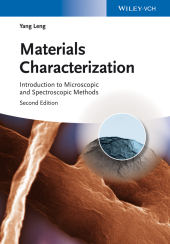 Neuerscheinungen 2013Stand: 2020-01-07 |
Schnellsuche
ISBN/Stichwort/Autor
|
Herderstraße 10
10625 Berlin
Tel.: 030 315 714 16
Fax 030 315 714 14
info@buchspektrum.de |

Yang Leng
Materials Characterization
Introduction to Microscopic and Spectroscopic Methods
2nd ed. 2013. 392 S. 337 SW-Abb., 27 Tabellen. 244 mm
Verlag/Jahr: WILEY-VCH 2013
ISBN: 3-527-33463-7 (3527334637)
Neue ISBN: 978-3-527-33463-6 (9783527334636)
Preis und Lieferzeit: Bitte klicken
While this second edition retains the successful didactical concept of its predecessor, all the sections have been thoroughly revised, updated and expanded, with two major new topics, plus 50 additional questions - in total around 20% new content.
Now in its second edition, this continues to serve as an ideal textbook for introductory courses on materials characterization, based on the author´s experience in teaching advanced undergraduate and postgraduate university students.
The new edition retains the successful didactical concept of introductions at the beginning of chapters, exercise questions and an online solution manual. In addition, all the sections have been thoroughly revised, updated and expanded, with two major new topics (electron backscattering diffraction and environmental scanning electron microscopy), as well as fifty additional questions - in total about 20% new content.
The first part covers commonly used methods for microstructure analysis, including light microscopy, X-ray diffraction, transmission and scanning electron microscopy, as well as scanning probe microscopy. The second part of the book is concerned with techniques for chemical analysis and introduces X-ray energy dispersive spectroscopy, fluorescence X-ray spectroscopy and such popular surface analysis techniques as photoelectron and secondary ion mass spectroscopy. This section concludes with the two most important vibrational spectroscopies (infra-red and Raman) and the increasingly important thermal analysis.
The theoretical concepts are discussed with a minimal involvement of mathematics and physics, and the technical aspects are presented with the actual measurement practice in mind. Making for an easy-to-read text, the book never loses sight of its intended audience.
PREFACE
LIGHT MICROSCOPY
Optical Principles
Instrumentation
Specimen Preparation
Imaging Modes
Confocal Microscopy
X-RAY DIFFRACTION METHODS
X-Ray Radiation
Theoretical Background of Diffraction
X-Ray Diffractometry
Wide-Angle X-Ray Diffraction and Scattering
TRANSMISSION ELECTRON MICROSCOPY
Instrumentation
Specimen Preparation
Image Modes
Selected-Area Diffraction (SAD)
Images of Crystal Defects
SCANNING ELECTRON MICROSCOPY
Instrumentation
Contrast Formation
Operational Variables
Specimen Preparation
Electron Backscatter Diffraction
Environmental SEM
SCANNING PROBE MICROSCOPY
Instrumentation
Scanning Tunneling Microscopy
Atomic Force Microscopy
Image Artifacts
X-RAY SPECTROSCOPY FOR ELEMENTAL ANALYSIS
Features of Characteristic X-Rays
X-Ray Fluorescence Spectrometry
Energy Dispersive Spectroscopy in Electron Microscopes
Qualitative and Quantitative Analysis
ELECTRON SPECTROSCOPY FOR SURFACE ANALYSIS
Basic Principles
Instrumentation
Characteristics of Electron Spectra
Qualitative and Quantitative Analysis
SECONDARY ION MASS SPECTROMETRY FOR SURFACE ANALYSIS
Basic Principles
Instrumentation
Surface Structure Analysis
SIMS Imaging
SIMS Depth Profiling
VIBRATIONAL SPECTROSCOPY FOR MOLECULAR ANALYSIS
Theoretical Background
Fourier Transform Infrared Spectroscopy
Raman Microscopy
Interpretation of Vibrational Spectra
THERMAL ANALYSIS
Common Characteristics
Differential Thermal Analysis and Differential Scanning Calorimetry
Thermogravimetry
INDEX


